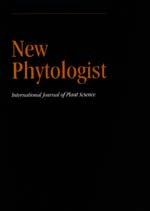Crossref Citations
This article has been cited by the following publications. This list is generated based on data provided by
Crossref.
De Kovel
and
De Jong
2000.
Selection on apomictic lineages of Taraxacum at establishment in a mixed sexual–apomictic population.
Journal of Evolutionary Biology,
Vol. 13,
Issue. 4,
p.
561.
Avila-Sakar, Germá;n
and
Domí;nguez, Cé;sar A.
2000.
PARENTAL EFFECTS AND GENDER SPECIALIZATION IN A TROPICAL HETEROSTYLOUS SHRUB.
Evolution,
Vol. 54,
Issue. 3,
p.
866.
Avila-Sakar, Germán
and
Domínguez, César A.
2000.
PARENTAL EFFECTS AND GENDER SPECIALIZATION IN A TROPICAL HETEROSTYLOUS SHRUB.
Evolution,
Vol. 54,
Issue. 3,
p.
866.
Sletvold, Nina
2002.
Effects of plant size on reproductive output and offspring performance in the facultative biennial Digitalis purpurea.
Journal of Ecology,
Vol. 90,
Issue. 6,
p.
958.
Fritz, R. S.
Hochwender, C. G.
Brunsfeld, S. J.
and
Roche, B. M.
2003.
Genetic architecture of susceptibility to herbivores in hybrid willows.
Journal of Evolutionary Biology,
Vol. 16,
Issue. 6,
p.
1115.
Burgess, Kevin S.
and
Husband, Brian C.
2004.
Maternal and paternal contributions to the fitness of hybrids between red and white mulberry (Morus, Moraceae).
American Journal of Botany,
Vol. 91,
Issue. 11,
p.
1802.
BLÖDNER, C.
GOEBEL, C.
FEUSSNER, I.
GATZ, C.
and
POLLE, A.
2007.
Warm and cold parental reproductive environments affect seed properties, fitness, and cold responsiveness in Arabidopsis thaliana progenies.
Plant, Cell & Environment,
Vol. 30,
Issue. 2,
p.
165.
Boyd, Elizabeth W.
Dorn, Lisa A.
Weinig, Cynthia
and
Schmitt, Johanna
2007.
Maternal Effects and Germination Timing Mediate the Expression of Winter and Spring Annual Life Histories inArabidopsis thaliana.
International Journal of Plant Sciences,
Vol. 168,
Issue. 2,
p.
205.
Whittle, C. A.
Otto, S. P.
Johnston, M. O.
and
Krochko, J. E.
2009.
Adaptive epigenetic memory of ancestral temperature regime inArabidopsis thalianaThis paper is one of a selection of papers published in a Special Issue from the National Research Council of Canada – Plant Biotechnology Institute..
Botany,
Vol. 87,
Issue. 6,
p.
650.
Baker, Robert L.
and
Diggle, Pamela K.
2011.
Node‐specific branching and heterochronic changes underlie population‐level differences in Mimulus guttatus (Phrymaceae) shoot architecture.
American Journal of Botany,
Vol. 98,
Issue. 12,
p.
1924.
Yakovlev, Igor A.
Asante, Daniel K.A.
Fossdal, Carl Gunnar
Junttila, Olavi
and
Johnsen, Øystein
2011.
Differential gene expression related to an epigenetic memory affecting climatic adaptation in Norway spruce.
Plant Science,
Vol. 180,
Issue. 1,
p.
132.
CHIANG, GEORGE C. K.
BARTSCH, MELANIE
BARUA, DEEPAK
NAKABAYASHI, KAZUMI
DEBIEU, MARILYNE
KRONHOLM, ILKKA
KOORNNEEF, MAARTEN
SOPPE, WIM J. J.
DONOHUE, KATHLEEN
and
De MEAUX, JULIETTE
2011.
DOG1 expression is predicted by the seed‐maturation environment and contributes to geographical variation in germination in Arabidopsis thaliana.
Molecular Ecology,
Vol. 20,
Issue. 16,
p.
3336.
Brachi, Benjamin
Aimé, Carla
Glorieux, Cédric
Cuguen, Joel
Roux, Fabrice
and
Laudet, Vincent
2012.
Adaptive Value of Phenological Traits in Stressful Environments: Predictions Based on Seed Production and Laboratory Natural Selection.
PLoS ONE,
Vol. 7,
Issue. 3,
p.
e32069.
Chiang, George C. K.
Barua, Deepak
Dittmar, Emily
Kramer, Elena M.
de Casas, Rafael Rubio
and
Donohue, Kathleen
2013.
PLEIOTROPY IN THE WILD: THE DORMANCY GENEDOG1EXERTS CASCADING CONTROL ON LIFE CYCLES.
Evolution,
Vol. 67,
Issue. 3,
p.
883.
Lopez-Gallego, Cristina
2013.
Genotype-by-Environment Interactions for Seedling Establishment Across Native and Degraded-Forest Habitats in a Long-Lived Cycad.
The Botanical Review,
Vol. 79,
Issue. 4,
p.
542.
Li, Yafei
Li, Xiangnan
Yu, Jingjie
and
Liu, Fulai
2017.
Effect of the transgenerational exposure to elevated CO 2 on the drought response of winter wheat: Stomatal control and water use efficiency.
Environmental and Experimental Botany,
Vol. 136,
Issue. ,
p.
78.
Upton, Racheal N.
Correr, Fernando H.
Lile, Jared
Reynolds, Gillian L.
Falaschi, Kira
Cook, Jason P.
and
Lachowiec, Jennifer
2023.
Design, execution, and interpretation of plant RNA-seq analyses.
Frontiers in Plant Science,
Vol. 14,
Issue. ,
Latzel, Vít
Fischer, Markus
Groot, Maartje
Gutzat, Ruben
Lampei, Christian
Ouborg, Joop
Parepa, Madalin
Schmid, Karl
Vergeer, Philippine
Zhang, Yuanye
and
Bossdorf, Oliver
2023.
Parental environmental effects are common and strong, but unpredictable, in Arabidopsis thaliana.
New Phytologist,
Vol. 237,
Issue. 3,
p.
1014.


